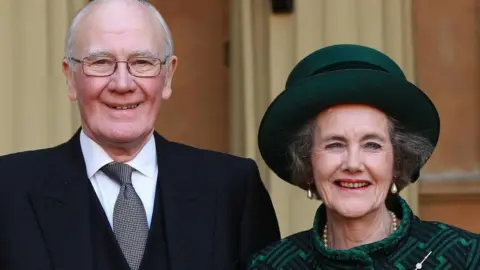Business
Tributes pour in for ex-Arsenal youth striker who died after injury

Read full article on post.
George CardenChichester and
Cash MurphySouth East
The death of Chichester City FC player Billy Vigar has “completely sent the club in a spin”, say fans.
Former Arsenal academy striker Vigar sustained a “significant brain injury” during an away match at Wingate and Finchley FC last Saturday.
It is thought the injury was caused when he collided with a concrete wall, but the club has not confirmed this. The 21-year-old died on Thursday after several days in an induced coma.
James Wilson, Chichester City season ticket holder, said: “Nobody should be able to go and play the sport they love and not come home again. It’s just so, so tragic. So young, so talented.”
 Getty Images
Getty ImagesFloral and card tributes to the Worthing-born footballer have been left at Chichester City’s ground.
A petition calling for a ban on brick walls around football pitches has received more than 4,000 signatures.
Launched by Jack Mison, it states: “Billy’s passing is not an isolated incident—countless players at all levels have suffered serious injuries, including broken bones, concussions, and life-altering trauma, as a result of these dangerous barriers.
“These walls serve no essential sporting purpose, yet they create an undeniable and avoidable hazard.”
 George Carden/BBC
George Carden/BBCMichael Stemp, from Bognor Regis, says he supports the recently-launched petition.
“I think that’s very sensible, I think this is long overdue…a few years ago there was a player at Bath [Alex Fletcher] who was badly injured,” he said.
Luke Griggs, chief executive of brain injury charity Headway UK, said this “tragedy has to be the catalyst for further discussions” about how to mitigate the risk of such head injuries.
He said: “This is the second such incident in the last few years, with Alex Fletcher of Bath City experiencing career ending injuries through a similar incident…
“Lower league football or rugby clubs with small, traditional grounds cannot be expected to rebuild their stadiums overnight, but there must be more accessible, affordable ways to mitigate the risk of this kind of injury.”
Chief executive of the Professional Footballers Association, Maheta Molango, said: “When the time is right, we will offer any assistance we can as part of any investigation process, specifically information that may be helpful regarding the safety of players in grounds.”
 George Carden/BBC
George Carden/BBCMr Wilson, who did not attend the game, added: “In a way I’m almost glad I wasn’t there…I can’t imagine what the players must be going through.”
Mr Stemp says he feels “very cut up” by Vigar’s death.
“It’s so sad for a youngster of only 21,” he added.
Wingate and Finchley, which has postponed its match against Canvey Island FC on Saturday, said everyone at the club is “deeply saddened” by the 21-year-old’s death.
“Our sincere condolences go out to Billy’s family, and to our friends at Chichester City FC at this incredibly difficult time,” the club posted on X.
Chichester City, whose match against Lewes on Saturday has also been postponed, posted: “Rest in peace Billy. Forever in the hearts of all at Chichester City Football Club.”
Tributes have come from many corners of the football world, including Vigar’s former clubs Arsenal, Derby County, Eastbourne Borough and Hastings United.
Business
Rahm booed on first tee as Ryder Cup begins

Read full article on post.
Watch the moment Europe’s Jon Rahm is booed approaching the first tee to kick of his foursome match with Tyrrell Hatton against Bryson DeChambeau and Justin Thomas at the 2025 Ryder Cup.
Follow day one of the 2025 Ryder Cup live on BBC Sport
Available to UK users only.
Business
What is the plan for digital ID cards and will they be mandatory?

Read full article on post.
Rachel Hagan
The government has announced plans to introduce a digital ID system across the UK, with Prime Minister Sir Keir Starmer saying it will ensure the country’s “borders are more secure”.
The IDs will not have to be carried day-to-day, but they will be compulsory for anyone wanting to work.
The government says the scheme will be rolled-out “by the end of the Parliament”.
Why is the government introducing digital ID cards?
The digital IDs will be used to prove a person’s right to live and work in the UK.
They will take the form of an app-based system, stored on smartphones in a similar way to the NHS App or digital bank cards.
Information on the holders’ residency status, name, date of birth, nationality and a photo will be included.
Announcing the scheme, Sir Keir said: “You will not be able to work in the United Kingdom if you do not have digital ID. It’s as simple as that.”
The government says the scheme is designed to curb illegal immigration by making it harder for people without status to find jobs. Ministers argue this is one of the key pull factors for migrants entering the UK illegally.
Employers will no longer be able to rely on a National Insurance number – which is currently used as part of proof of right to work – or paper-based checks.
However, Conservative leader Kemi Badenoch said that while there are arguments “for and against” digital ID, making it mandatory “requires a proper national debate”.
In a post on X she said: “Can we really trust [Labour] to implement an expensive national programme that will impact all of our lives and put additional burdens on law abiding people? I doubt it.”
Liberal Democrats’ Shadow Attorney General Ben Maguire told the BBC the party was “struggling” to see how the policy would have a meaningful impact on illegal migration.
Will digital ID be compulsory and what else could it be used for?
Digital ID will be available to all UK citizens and legal residents, and mandatory in order to work.
However, for students, pensioners or others not seeking work, having a digital ID will be optional.
Officials also stress it will not function like a traditional identity card: people will not be required to carry it in public.
Ministers have ruled out requiring the ID for access to healthcare or welfare payments.
However, the system is being designed to integrate with some government services, to make applications simpler and reduce fraud.
The government said that, in time, digital IDs would make it easier to apply for services such as driving licences, childcare and welfare. It said it would also simplify access to tax records.
Will people who don’t have a smartphone need a digital ID card?
The government has promised the system will be “inclusive” and work for those without smartphones, passports or reliable internet access.
A public consultation expected to be launched later this year will include looking at alternatives – potentially including physical documents or face-to-face support – for groups such as older people or the homeless.
Which other countries already have ID cards?
The UK government has said it will “take the best aspects” of digital ID systems used elsewhere around the world, including Estonia, Australia, Denmark and India.
Each of these countries has its own unique system, but all use it as a way for people to prove who they are when accessing certain government or banking services.
- Estonia introduced its mandatory digital ID system in 2002, and people use it to access medical records, voting, banking and digital signatures. It’s primarily stored on peoples’ smartphones as a digital version of an ID card
- Australia and Denmark have digital ID apps that people can download and use to log into government and private services. Neither require citizens to have it
- India has a system through which people can obtain a unique 12-digit reference number to use as proof of residence and identity
Many other countries also use digital ID of one kind or another, including Singapore, Greece, France, Bosnia and Herzegovina, the United Arab Emirates, China, Costa Rica, South Korea and Afghanistan.
Has the UK tried to introduce ID cards before?
Yes. Tony Blair’s Labour government legislated for voluntary ID cards in the early 2000s.
However, the scheme was scrapped in 2011 by the Conservative-led coalition, which argued it was too costly and intrusive.
The UK has only had compulsory ID cards during wartime. Although they stayed in place for several years after World War Two, Winston Churchill’s government scrapped them in 1952 following criticism over costs and police use.
Why are some people against digital ID?
Civil liberties groups argue that even a limited digital ID could pave the way for a more intrusive system, raising concerns about privacy, data security and government overreach.
Big Brother Watch, alongside seven other organisations, has written to the prime minister urging him to abandon the plan, saying it will “push unauthorised migrants further into the shadows”.
More than 850,000 people have signed a petition against introducing digital ID cards, on the UK Parliament website. Petitions that get more than 100,000 signatures are considered for a debate in Parliament.
Other prominent critics include the former Conservative cabinet minister David Davis – who campaigned against Labour’s ID card scheme in the 2000s.
He said “no system is immune to failure” and warned governments and tech companies have repeatedly failed to protect people’s data.
Business
Former Lib Dem leader Sir Menzies Campbell dies aged 84

Read full article on post.
Catherine LystBBC Scotland
Former Liberal Democrat leader Sir Menzies Campbell has died at the age of 84.
Sir Menzies, or Ming as he was widely known, led the Liberal Democrats from 2006 to 2007 and was the MP for North East Fife at Westminster for 28 years.
In his first career as a sprinter, he held the UK 100m record from 1967 to 1974 and ran in the 1964 Tokyo Olympics – being dubbed The Flying Scotsman.
Lib Dem leader Ed Davey described Sir Menzies as “a dedicated public servant and a true Liberal giant”.
He said: “His principled leadership opposing the Iraq War was a mark of his morality, courage and wisdom.
“But more than that, he was an incredibly warm and caring friend and colleague. We will miss him terribly.”
Sir Menzies died peacefully in London following a period of respite care. His grandson was with him.
His family said one of his final days was spent watching the Liberal Democrats Party Conference, and enjoying watching video messages from political friends.
 Getty Images
Getty ImagesSir Menzies first stood as a Liberal Party candidate in 1976, but did not win his constituency for 11 years.
He made his name as the party’s foreign affairs spokesman, a position he held for 14 years and was a renowned critic of the Iraq war.
He became a member of the House of Lords in 2015. His official title was Baron Campbell of Pittenweem.
Expressing his condolences, Scotland’s First Minister John Swinney said Sir Menzies was one of the country’s most “well-liked political figures”.
He said Sir Menzies was “a passionate believer in a better Scotland” but also a strong internationalist – keen to build consensus and find common ground.
Swinney said: “Those entering public service today could learn much from his style – always forthright in speaking up for what he believed in, but never anything other than respectful, courteous and polite to his political opponents.”
Scottish Liberal Democrat leader Alex Cole-Hamilton MSP said Sir Menzies was one of the “most respected politicians of his generation”.
He said: “The first political thing I ever did was to deliver leaflets for Ming on the morning of his first election to Parliament in 1987.
“He was my MP, he was my mentor and he was my friend. From the Olympic track to the benches of Westminster, his contribution to public life will long be remembered.”
Wendy Chamberlain, current MP for North East Fife, said Sir Menzies “remained a significant figure” in the area.
She added: “His contributions to our communities, to the University of St Andrews, as well as to Scotland and the UK were immeasurable.
“Although he found the passing of his beloved Elspeth difficult, rather than retreat, until the last weeks of his life, he was still travelling to London to contribute in the House of Lords.”
Born Walter Menzies Campbell on 22 May 1941, Sir Menzies was brought up in a Glasgow tenement.
He was educated at Hillhead High School and went on to the University of Glasgow, where he was a contemporary of both John Smith and Donald Dewar studying Law and debating in the union.
He also attended Stanford University in California during the Vietnam War and later became an advocate.
Sprinting record
Sir Menzies was called to the Scottish bar in 1968 and made a QC (latterly KC) in 1982. The law gave him a lucrative career and he continued to practise throughout his time in politics.
His wife of more than 50 years, Elspeth, died in June 2023 – he described her as his “constant political companion, always my encouragement and forever my first line of defence”.
The couple were married in June 1970, just three months after first meeting.
During his athletics career, Sir Menzies captained the British men’s team at the 1966 Commonwealth Games in Jamaica.
A year later he set a new British 100m record of 10.2 seconds – beating a young OJ Simpson in the process. The record stood until 1972.
At one point he was known as “the fastest white man on the planet”.

Menzies Campbell’s contribution to our politics was far greater than his short spell as party leader suggests.
His was an extremely well informed voice on defence and foreign affairs which was central to the public debate during and after the Iraq war.
He and his late wife Elspeth were the best of political company with a great deal of insight into the Westminster issues and characters of the day.
In many ways Elspeth was more ambitious for her husband than he was for himself. His period as party leader was not a happy one.
He was on the receiving end of a persistent ageism – caricatured as a grandfatherly figure with his best days behind him when compared with rival leaders like Tony Blair and David Cameron.
When appearing on TV for interview he always insisted on wearing a tie because he felt it was what his constituents would expect.
But I knew he’d given in to modernising advisers who wrongly thought they could reinvent his image when one Sunday morning he appeared in our studio in an open-necked shirt. It was not long before he resigned.
It was his wisdom, experience and courtesy that were his greatest strengths and these were undervalued qualities during his time at the top.
-
Politics3 days ago
European Parliament snubs Orbán with vote to shield Italian MEP from Hungarian arrest
-
Culture3 weeks ago
Life, loss, fame & family – the IFI Documentary Festival in focus
-
Health4 days ago
EU renews support for WHO’s Universal Health Coverage Partnership
-
Environment6 days ago
Key oceans treaty crosses threshold to come into force
-
Culture2 months ago
Fatal, flashy and indecent – the movies of Adrian Lyne revisited
-
Culture3 days ago
Twilight at 20: the many afterlives of Stephenie Meyer’s vampires
-
Culture1 week ago
Farewell, Sundance – how Robert Redford changed cinema forever
-
Culture3 weeks ago
What is KPop Demon Hunters, and why is everyone talking about it?


















































